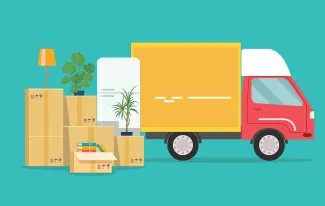
Five Important Questions When Considering A New Home
By Marcia Zappa and Kyle Berg, CFP®, BFA™
Buying a home is a daunting task for anyone at any stage of life. Buying a home while raising a toddler with another one on the way can just about put you over the edge. I would know, as this is something I recently did.
I have a theory that pregnancies become “real” for different parents at different times. For some, it’s when you see that second pink line. For others, it isn’t until you hold your newborn for the first time. For me and my husband, it was when we learned the gender of each of our impending spawn. Once we knew baby number two was a boy, it was time to get serious. And one of the first things we needed to decide was – was it time for a bigger house?
We’d been struggling with this question for months. Luckily, we already had relationships with a real estate agent, mortgage lender, and of course, Financial Planner — Steve Drost. So, we had plenty of places to turn to for advice. But, there were still several important factors to consider. Ultimately, we decided that a new house was the right move for our family. But I’d like to share a few of our biggest considerations, for anyone who might be in a similar situation (with or without the terrible twos and pregnancy hormones):
-
Would you rather risk being homeless or paying two mortgages?
I originally went into this process thinking that it was obvious that we needed to sell our current home before buying a new home. Who wants to pay two mortgages? But this plan presented several concerns: Would we miss out on a house we loved? Would we be forced to settle for whatever is available when we needed a home? Or (scariest of all), would we have to move in with our parents?
It was our mortgage lender that planted the idea that paying two mortgages is a choice that some people make. Securing our new home before selling our current home would allow us to make a confident decision at a time that was right for us without the risk of being homeless. After considering his suggestion, it became an easy decision for us. Houses in both our current area and our desired area were going fast. With a relatively low mortgage on our current home and our growing family to think about, it was much more important to us to get settled in our new home, even if it meant possibly paying two mortgages for a couple of months.
-
What about making a contingent offer?
After reading question one, many of you may be wondering why we didn’t simply avoid both scenarios by making an offer contingent on selling our current home. And you’re right, in many situations that could be the way to go. But as mentioned above, at the time we were buying, homes in our desired area were going fast. Our realtor advised us that contingent offers were less desirable, and could cause us to miss out. This just wasn’t a risk we were willing to take.
-
How will a larger mortgage affect your cash flow and savings goals?
I think it’s safe to assume that most people wouldn’t go through the ordeal of moving unless they are making a pretty major upgrade — with a correspondingly major price increase. So, it’s doubtful that simply skipping your morning latte will be enough to cover the difference between your current mortgage and your new mortgage.
When considering taking on a larger mortgage, try to think in concrete terms about what you will be giving up to accommodate it. You may need to make a lifestyle change, such as forgoing travel or new vehicle purchases. Or, you may need to lower your monthly savings, be it your retirement savings, your HSA contributions, or saving for your children’s education. Also, if you will be taking out a 30-year mortgage to pay for your new home, it may affect your cash flow and savings goals for many years. Your specific situation will determine exactly how a larger mortgage will affect your financial goals, so it is important to discuss it with your Financial Planner.
-
What are the “hidden costs” associated with an upgraded home?
Your mortgage isn’t the only cost that will increase if you decide to upgrade your home. You’ve probably already realized that your property taxes and home owners insurance will increase as well. But have you considered a possible Home Owners Association fee? Or, that more house generally means more upkeep costs? Imagine if the modest windows in your current home need replacing. Now, imagine if the soaring, two story windows in the grand foyer of your new dream home need replacing. Big difference. Heating and cooling a larger home will also likely have an additional cost. And, one-time costs associated with closing, moving, and decorating should not be overlooked. Even if your new home is “move in ready,” you’ll almost certainly want to invest in some new furniture or art to fit the new space.
-
Are you physically and emotionally up for a move?
It may sound a bit dramatic, but I really feel this is an important thing to think through. Moving requires a LOT of time and effort — searching online and touring new homes, staging your current home, cleaning before showings, leaving during showings (and if you have young children, where do you go? And, what do you do about naptime?), and tracking all of the paperwork involved in each step of the process. And we haven’t even gotten to the actual move yet! You can never truly appreciate the amount of STUFF you own until you attempt to put it all into boxes.
Moving can be emotionally challenging as well. All of the decisions involved can be a major source of stress. Finding a home almost always requires compromises, which can be frustrating and disappointing. And, it may be hard to say goodbye to your current home. As much as I love my growing family, it was really hard to say goodbye to my carefree, childfree, newlywed starter home. (Admittedly, the pregnancy hormones probably didn’t help.)
I have many friends and acquaintances, about my age and stage of life, who are on the fence about upgrading their homes. Or, who know it’s something they want to do, but are on the fence about exactly when, how, and to what degree to do it. If you’re in this situation, hopefully some of the questions presented here will help get you thinking. But since everyone’s situation is unique, it’s important to discuss decisions like this with your Financial Planner. After all, that’s what they’re there for.

